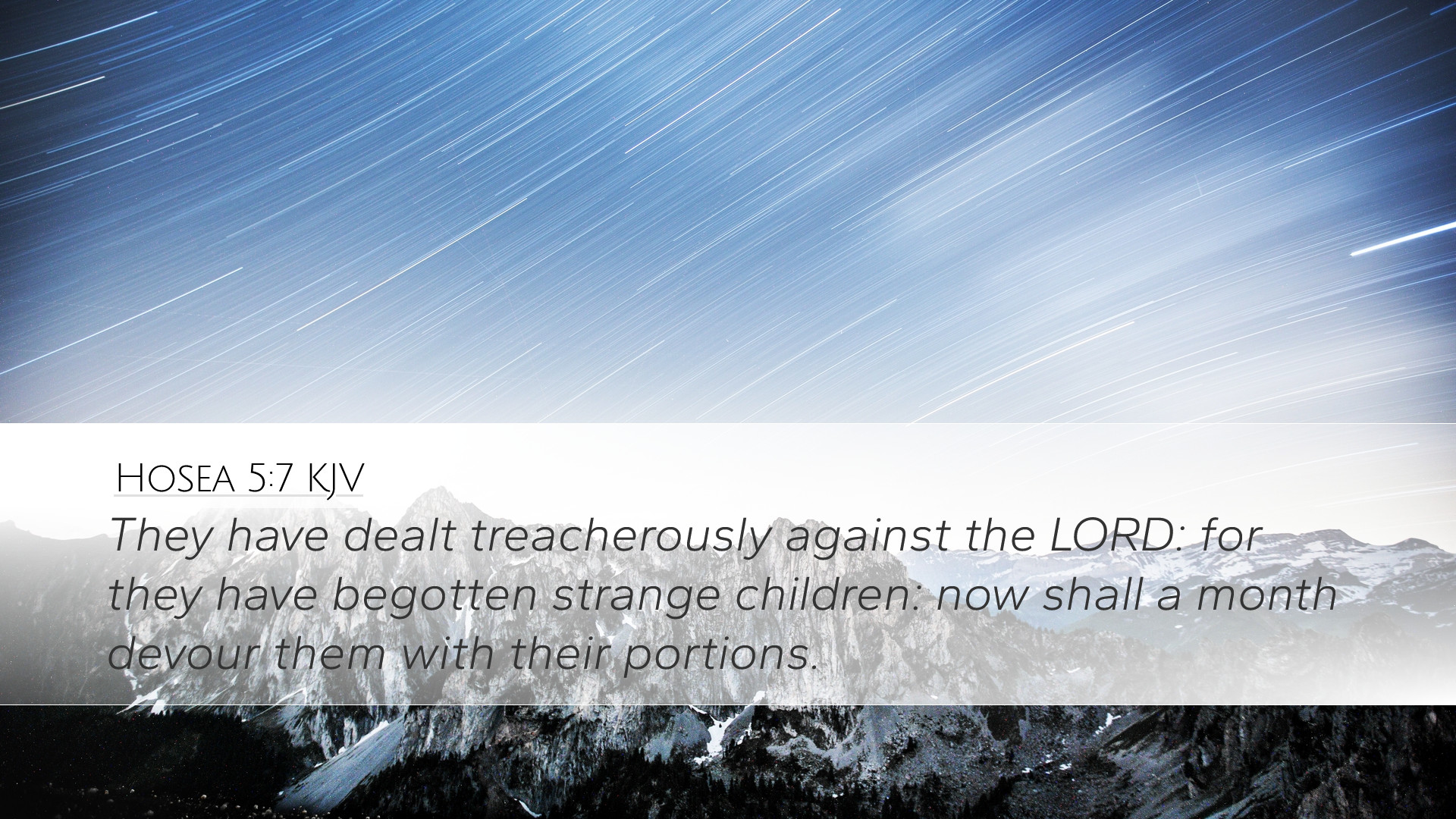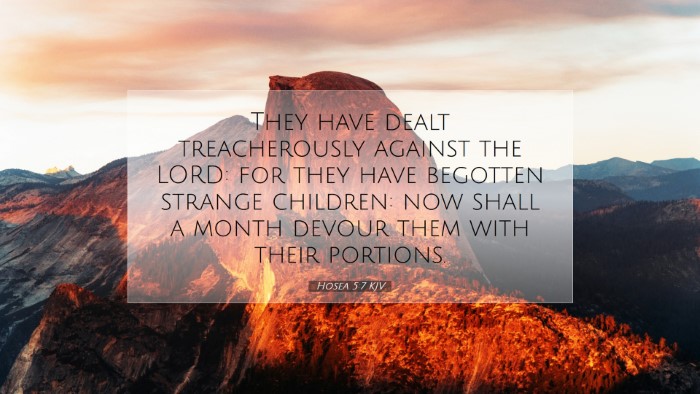Old Testament
Genesis Exodus Leviticus Numbers Deuteronomy Joshua Judges Ruth 1 Samuel 2 Samuel 1 Kings 2 Kings 1 Chronicles 2 Chronicles Ezra Nehemiah Esther Job Psalms Proverbs Ecclesiastes Song of Solomon Isaiah Jeremiah Lamentations Ezekiel Daniel Hosea Joel Amos Obadiah Jonah Micah Nahum Habakkuk Zephaniah Haggai Zechariah MalachiHosea 5:7
Hosea 5:7 KJV
They have dealt treacherously against the LORD: for they have begotten strange children: now shall a month devour them with their portions.
Hosea 5:7 Bible Commentary
Commentary on Hosea 5:7
Bible Verse (Hosea 5:7): "They have dealt treacherously against the LORD: for they have begotten strange children: now shall a month devour them with their portions."
Introduction
The Book of Hosea is one of the most provocative prophetic texts in the Old Testament, highlighting the relationship between God and Israel, often depicted as that of a faithful partner and an unfaithful spouse. In Hosea 5:7, the prophet proclaims a potent message that reveals the consequences of the people's betrayal and idolatry.
Analysis of the Verse
This verse encapsulates several key themes regarding treachery against God, the bearing of "strange children," and divine judgement.
Dealing Treacherously Against the LORD
Matthew Henry emphasizes the charge of treachery directed at Israel, illustrating how their infidelity to God manifests in unfaithfulness to the covenant. The word “treacherously” indicates a willful breach of the sacred trust that God had established with His people.
Moreover, Albert Barnes elaborates that the people of Israel have not only broken their covenant but have also turned to foreign gods, thereby leading their children astray. This treachery is seen as both moral and spiritual, highlighting the severity of Israel’s unfaithfulness.
Begotten Strange Children
The phrase “strange children” represents offspring that do not belong to God's covenantal promises. Adam Clarke notes that these "strange children" may refer to the idolatry that led to natural offspring who did not honor Yahweh. This implies spiritual defilement resulting from the choice to follow idols instead of the true God.
This also points to the generational consequences of sin, where the innocence of children is compromised by the transgressions of their parents. The idea of begetting “strange children” underlines the urgency of spiritual fidelity, for the legacy of unfaithfulness will persist through the generations.
Judgment and Punishment
The latter part of the verse, “now shall a month devour them with their portions,” denotes an impending judgment. Here, Matthew Henry explains that the timeframe of "a month" may symbolize a swift divine judgment—one that will consume what the people have cherished and claimed as their own. The metaphor suggests a complete and rapid destruction that highlights God’s displeasure with unrepentant Israel.
Albert Barnes further elucidates that this phrasing can be understood as God preparing to take away not only their material blessings but also their spiritual legacy. The brought-on calamity serves as a divine response to their idolatrous and rebellious stance against Him.
Theological Implications
The passage raises important theological questions about covenant fidelity and the nature of divine judgment. It highlights how transgressions affect not just individuals, but entire communities.
- Covenant Relationship: The emphasis on "treachery" invites reflection on the seriousness of keeping covenant with God.
- Generational Consequences: The reference to "strange children" poses concerns regarding the impact of parental choices on future generations.
- Divine Judgment: The notion that a month shall "devour them" points to the urgency and inevitability of divine justice against persistent rebellion.
Practical Applications
For pastors, students, and theologians, Hosea 5:7 not only reveals God's character but also serves as a somber reminder of the consequences of straying from His paths.
- Faithfulness in Ministry: Leaders must remain faithful to their calling, ensuring they lead their congregations toward Biblical fidelity.
- Teaching Future Generations: It is vital to educate the children in your church about the importance of covenant faithfulness to break any cycles of disobedience.
- Understanding Judgment: Recognizing that unrepentant sin leads to consequences can foster a spirit of humility and repentance within a congregation.
Conclusion
Hosea 5:7 serves as a profound reflection on the dangers of spiritual infidelity and the divine consequences of such betrayal. The insights from Matthew Henry, Albert Barnes, and Adam Clarke enhance our understanding of the text, demonstrating how it resonates across time with contemporary issues related to leadership, fidelity, and community integrity. As we meditate on this passage, may we strive to cultivate a deeper relationship with God and uphold the integrity of our covenant with Him.


